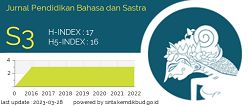THE DEVELOPMENT OF CLASSROOM POLICIES THROUGH DISCUSSION BETWEEN TEACHERS AND STUDENTS
Abstract
Abstract
This article presented the result in the interview and discussion between teacher and students aimed at revealing students’ perception on the previous course program. Of the interview and discussion, it was observed that the previous program was not conducted optimally in term of knowledge and oral language proficiency development where the students perceived it was very important. In order to bridge the gap, discussion was arranged. As a result, mutual agreement between the teacher and the students was achieved. In order to materialize the goal of learning both the teacher and the students agreed upon: 1) using English as a medium of communication during the learning program, 2) learning activities were conducted through presentation and discussion, 3) it was highly expected that students came to the class on time, tolerance for late comers would only be 10 minutes, 4) it was highly required that students met 75% of attendance at minimum, in order to participate in the final exam, 5) Assignment must be submitted punctually based on the schedule, 6) students were endorsed to actively participate in the learning activities.
Keywords: classroom policies, discussion, speaking proficiency, knowledge development
Keywords
Full Text:
PDFReferences
Barker, R. G. (1963). On the nature of the environment. Journal of Social Issues, 21, 17-38.
Barton, A. C., Johnson V., & The Students in Ms. Johnson’s Grade 8 science classes (2002). Truncating Agency : Peer Review and Participatory Research. Research in Science Education, 32, 191–214.
Doyle, W., & Carter, K. (2016). Academic Tasks in Classrooms Academic Tasks in Classrooms, 6784(June). http://doi.org/10.1080/03626784.1984.11075917
Kelly, B. M. (2016). Definition of Classroom Management, 4–7. Retrieved from http://712educators.about.com/od/classroomhelpers/g/Definition-Of-Classroom-Management.htm
First, P. (2014). Classroom Management Strategies Classroom Management, 1–14.
Kemmis, S. and McTaggart, R. (n.d). Participatory Action Research: Communicative and The Public Sphere. Retrieved from: http://citeseerx.ist.psu.edu/viewdoc/download?doi=10.1.1.473.4759&rep=rep1&type=pdf
Lieberman, A. (1994). Transforming urban schools: Building knowledge and building community. In M. Fine (Ed.), Chartering urban school reform: Reflections on public high schools in the midst of change (pp. 204–207). New York: Teachers College Press.
DOI: https://doi.org/10.17509/bs_jpbsp.v16i2.4480
Refbacks
- There are currently no refbacks.
Copyright (c) 2016 Jurnal Pendidikan Bahasa dan Sastra
p-ISSN 1412-0712 | e-ISSN 2527-8312
JPBS is published by:
Fakultas Pendidikan Bahasa dan Sastra (Faculty of Language and Literature Education), Universitas Pendidikan Indonesia,
in cooperation with
TEFLIN, and APPBIPA


